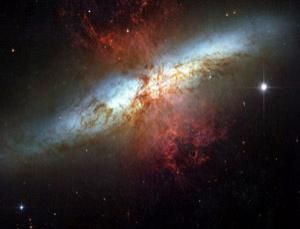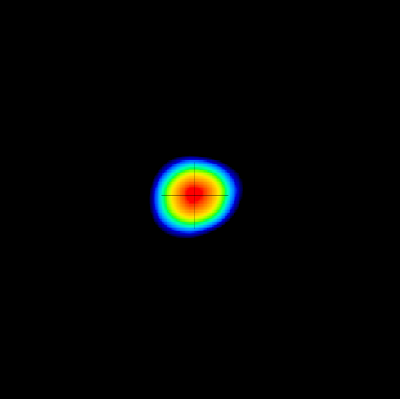Credit: Abovetopsecret.com
There is something strange in the cosmic neighbourhood. An unknown object in the nearby galaxy M82 has started sending out radio waves, and the emission does not look like anything seen anywhere in the universe before.
"We don't know what it is," says co-discoverer Tom Muxlow of Jodrell Bank Centre for Astrophysics near Macclesfield, UK.
The thing appeared in May last year, while Muxlow and his colleagues were monitoring an unrelated stellar explosion in M82 using the MERLIN network of radio telescopes in the UK. A bright spot of radio emission emerged over only a few days, quite rapidly in astronomical terms. Since then it has done very little except baffle astrophysicists.
It certainly does not fit the pattern of radio emissions from supernovae: they usually get brighter over a few weeks and then fade away over months, with the spectrum of the radiation changing all the while. The new source has hardly changed in brightness over the course of a year, and its spectrum is steady.
Mysterious radio waves emitted from nearby galaxy
This is pretty interesting, but check this out!
Yet it does seem to be moving – and fast: its apparent sideways velocity is four times the speed of light
This is an image of the M82 Galaxy that the signal is coming from:
for you google sky users M82 is located at RA 9h55m52.72s Dec 69'40'50.30" (or just search M82!)
But what could this be?
Could the object be a black hole? It is not quite in the middle of M82, where astronomers would expect to find the kind of supermassive central black hole that most other galaxies have. Which leaves the possibility that it could be a smaller-scale "microquasar".
Whatever it is, it sure is interesting, and Tom Muxlow of Jodrell Bank Centre for Astrophysics near Macclesfield, UK will report the discovery at the Royal Astronomical Society National Astronomy Meeting in Glasgow, UK, today. So I look foreward to his report!
Here is what the signal looks like:

Here is a short vid showing the M82 galaxy:
Wednesday, April 14, 2010
Mysterious radio waves emitted from nearby galaxy
Labels: astronomy, black hole, m82 galaxy, microquasar, radio waves
Posted by Admin at 12:15 PM
Subscribe to:
Post Comments (Atom)


0 comments:
Post a Comment